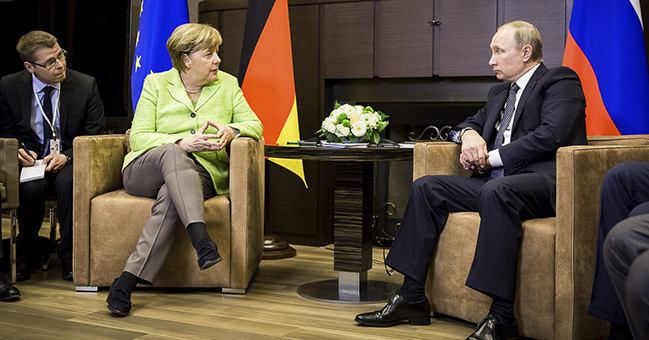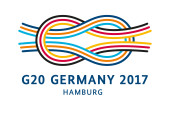Angela Merkel meets Vladimir Putin in Sochi
Open dialogue in spite of differences of opinion
During her visit the Chancellor pointed to the importance of civil liberties for civil society. With respect to the conflict in Ukraine she called for an implementation of the Minsk agreements. Also on the agenda were the situation in Syria and the G20 summit in July.
 Chancellor Angela Merkel discussed international crises with Russian President Vladimir Putin
Photo: Bundesregierung/Denzel
Chancellor Angela Merkel discussed international crises with Russian President Vladimir Putin
Photo: Bundesregierung/Denzel
"Although there are still serious differences of opinion on some issues, we must talk because otherwise we will descend into silence and have less and less understanding for one another," said Chancellor Angela Merkel at a joint press conference with Russia’s President Vladimir Putin in Sochi.
With a view to the situation within Russia, Angela Merkel reported that she had pointed out the importance of the freedom to demonstrate and the role of non-governmental organisations in civil society. She stated, "We are receiving extremely negative reports in particular about the treatment of homosexuals in Chechnya." She reported that she had asked Vladimir Putin to use his influence here and in the case of the Jehovah’s Witnesses.
Encouraging critical dialogue
The Petersburg Dialogue, said the Chancellor, has "become a forum in which even critical issues can be addressed very openly". She has done much to ensure the continuation of this dialogue, as has the Russian side, she added. "It is very important to me that our civil societies engage in dialogue, even if there are differences of opinion."
The Petersburg Dialogue is a forum of partners from German and Russian civil society. It is organised by the German-Russian Forum, which is a non-governmental organisation. The Chancellor is patron of the Petersburg Dialogue.
Close economic relations
At their press conference Angela Merkel and Vladimir Putin also underscored the importance of bilateral economic relations. After China, Germany is Russia’s second most important trading partner, reported Vladimir Putin. Relations are also very close in the fields of science, research and youth exchanges in particular, said Angela Merkel.
Sanctions will remain in place
The situation in eastern Ukraine was another main point on the agenda. In this context the EU imposed sanctions on Russia. The Chancellor stressed that as far as she is concerned "the aim is still to implement the Minsk agreements and thus arrive at a point where the European Union can lift the sanctions".
There is, admittedly, a link to the implementation of the Minsk agreements. The process is arduous, said the Chancellor. Progress is only incremental, with repeated setbacks.
Roadmap needed for elections in eastern Ukraine
"The question of a ceasefire is vitally important, as is the matter of exchanging prisoners." Nevertheless, "progress must also be made in the political process we undertook to support in Minsk". Elections must thus be held that will provide for legitimate governance in the separatist-controlled parts of eastern Ukraine. "For this we need a roadmap."
In spite of the laborious course of talks, Angela Merkel stressed that there is no reason to doubt the Minsk agreement. "The implementation is what is missing, not the agreement." She reported that she had asked Vladimir Putin to do all he can to facilitate a ceasefire in eastern Ukraine.
Syria – helping people in acute distress
On Syria, the Chancellor reported that she had made it clear that Germany "is willing to do whatever it takes to support a ceasefire so that people in acute distress can be helped." She also believes that the concept of "safe zones" is worth working on.

